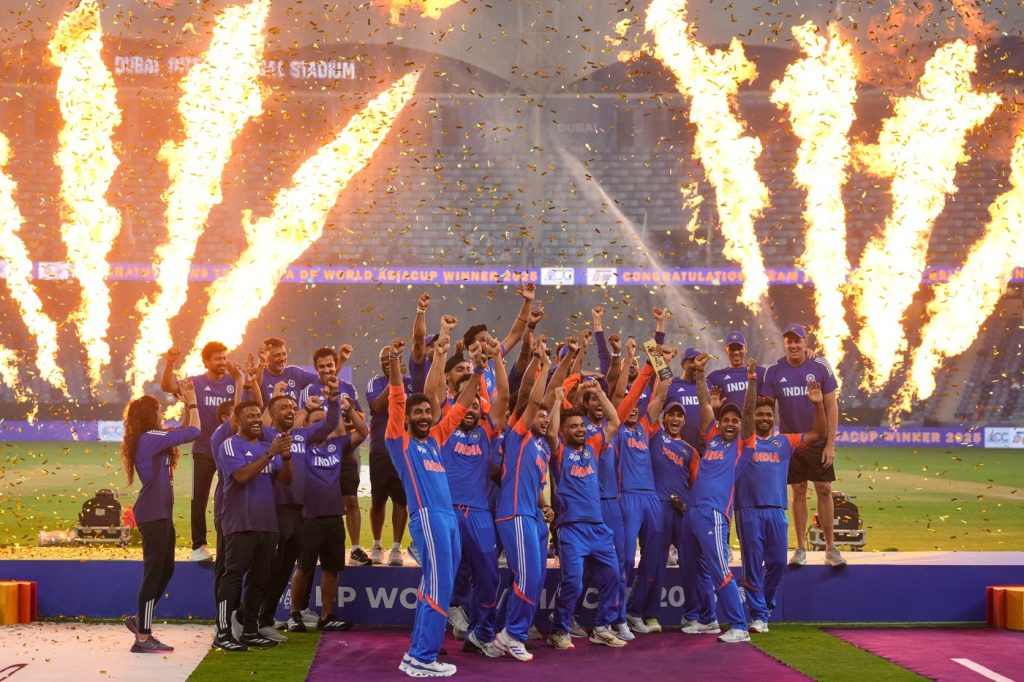DUBAI, United Arab Emirates (AP) — The ongoing political tensions between India and Pakistan have spilled onto the cricket field, culminating in a dramatic moment during the Asia Cup final where the Indian team refused to accept the trophy from a senior Pakistani official. This incident comes after India's cricket team notably refrained from shaking hands with their rivals during all three matches of the tournament.
During the final match at the Dubai International Cricket Stadium on Sunday, Tilak Varma's impressive half-century helped India secure victory against Pakistan, marking their ninth Asia Cup title and their second in the T20 format. Tensions, however, escalated during the post-match presentation ceremony, which was initially delayed for over an hour. The Pakistan team, led by captain Salman Agha, arrived late, leading to further hold-ups as the Indian team declined to accept the trophy from Mohsin Naqvi, the chief of the Asian Cricket Council (ACC) and also the head of the Pakistan Cricket Board (PCB).
Indian Twenty20 skipper Suryakumar Yadav expressed his disbelief over the situation, stating it was unprecedented for a champion team to be denied their trophy. In the post-match press conference, he emphasized, “This is one thing which I have never seen since I started playing cricket, started following cricket – a champion team is denied a trophy, that too a hard-earned one.” Despite the turmoil, Yadav reassured that the real accolades are found within the team's collective effort rather than in material trophies.
Prior to the ceremony, an official removed the Asia Cup trophy from the stage, and the ACC did not provide any explanation for this decision. Eventually, Simon Doull, a former New Zealand cricketer and broadcaster, announced to the audience that the Indian cricket team would not be accepting their awards, effectively concluding the presentation. Interestingly, the Pakistani team received their runners-up medals from Aminul Islam, the president of the Bangladesh Cricket Board, and a check from Naqvi without any further incident.
BCCI secretary Devajit Saikia stated that the team’s refusal to accept the trophy from Naqvi was a matter of principle, citing his position as a significant leader within Pakistan. Saikia lamented the situation, asserting their hope for the trophy and medals to be returned to India promptly. Furthermore, he indicated that a formal protest would be lodged at an upcoming ICC conference in November in Dubai regarding the conduct of the ACC chairman.
This Asia Cup represented a cautious step towards reviving cricket ties between India and Pakistan, following heightened border tensions earlier in the year, which notably disrupted the Indian Premier League (IPL) and Pakistan Super League. Throughout the tournament, India’s players maintained their stance of not shaking hands with their Pakistani counterparts, even amidst threats from Pakistan of withdrawing from the tournament due to the “handshake controversy.” There were no handshakes witnessed after the final match or at the toss, leaving a lingering sense of animosity between the two teams.
Captain Salman Agha expressed his disappointment with India’s actions, claiming they were not only disrespectful to the Pakistani team but also to the spirit of cricket. He criticized the Indian team's behavior, stating, “Good teams don’t do what they did today,” and called for a more respectful representation as role models for the youth of both nations.
In a striking display of sportsmanship, Agha noted that Suryakumar had previously engaged in a handshake during a pre-tournament meeting, indicating a potential disconnect between private decorum and public display. The Pakistan captain emphasized the negative example set by both teams, which could influence young fans watching in both countries.











